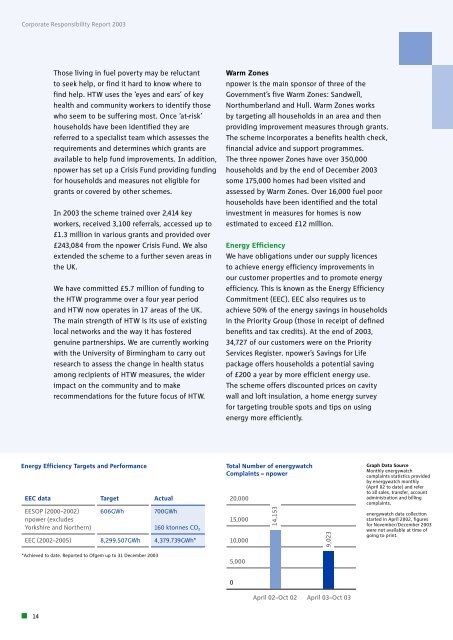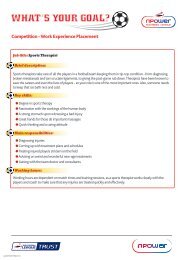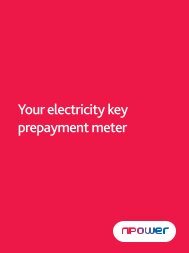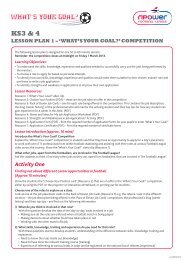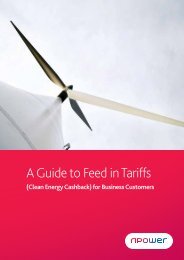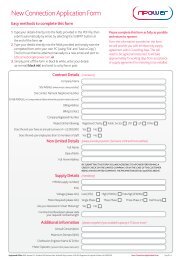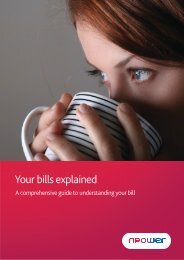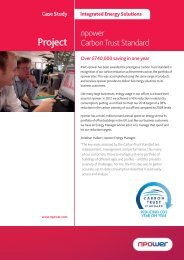Shared Responsibility - Npower
Shared Responsibility - Npower
Shared Responsibility - Npower
Create successful ePaper yourself
Turn your PDF publications into a flip-book with our unique Google optimized e-Paper software.
Corporate <strong>Responsibility</strong> Report 2003Those living in fuel poverty may be reluctantto seek help, or find it hard to know where tofind help. HTW uses the ‘eyes and ears’ of keyhealth and community workers to identify thosewho seem to be suffering most. Once ‘at-risk’households have been identified they arereferred to a specialist team which assesses therequirements and determines which grants areavailable to help fund improvements. In addition,npower has set up a Crisis Fund providing fundingfor households and measures not eligible forgrants or covered by other schemes.In 2003 the scheme trained over 2,414 keyworkers, received 3,100 referrals, accessed up to£1.3 million in various grants and provided over£243,084 from the npower Crisis Fund. We alsoextended the scheme to a further seven areas inthe UK.We have committed £5.7 million of funding tothe HTW programme over a four year periodand HTW now operates in 17 areas of the UK.The main strength of HTW is its use of existinglocal networks and the way it has fosteredgenuine partnerships. We are currently workingwith the University of Birmingham to carry outresearch to assess the change in health statusamong recipients of HTW measures, the widerimpact on the community and to makerecommendations for the future focus of HTW.Warm Zonesnpower is the main sponsor of three of theGovernment’s five Warm Zones: Sandwell,Northumberland and Hull. Warm Zones worksby targeting all households in an area and thenproviding improvement measures through grants.The scheme incorporates a benefits health check,financial advice and support programmes.The three npower Zones have over 350,000households and by the end of December 2003some 175,000 homes had been visited andassessed by Warm Zones. Over 16,000 fuel poorhouseholds have been identified and the totalinvestment in measures for homes is nowestimated to exceed £12 million.Energy EfficiencyWe have obligations under our supply licencesto achieve energy efficiency improvements inour customer properties and to promote energyefficiency. This is known as the Energy EfficiencyCommitment (EEC). EEC also requires us toachieve 50% of the energy savings in householdsin the Priority Group (those in receipt of definedbenefits and tax credits). At the end of 2003,34,727 of our customers were on the PriorityServices Register. npower’s Savings for Lifepackage offers households a potential savingof £200 a year by more efficient energy use.The scheme offers discounted prices on cavitywall and loft insulation, a home energy surveyfor targeting trouble spots and tips on usingenergy more efficiently.Energy Efficiency Targets and PerformanceEEC dataEESOP (2000–2002)npower (excludesYorkshire and Northern)EEC (2002–2005)Target606GWh8,299.507GWhActual700GWh160 ktonnes CO 24,379.739GWh*Total Number of energywatchComplaints – npower20,00015,00010,00014,1539,023Graph Data SourceMonthly energywatchcomplaints statistics providedby energywatch monthly(April 02 to date) and referto all sales, transfer, accountadministration and billingcomplaints.energywatch data collectionstarted in April 2002, figuresfor November/December 2003were not available at time ofgoing to print.*Achieved to date. Reported to Ofgem up to 31 December 20035,0000April 02–Oct 02April 03–Oct 0314


